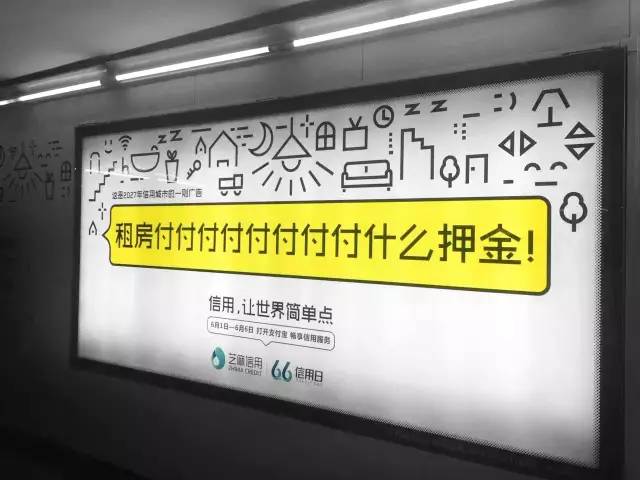Don't forget to pay pay pay pay pay the rent
« previous post | next post »
Recently, signs like this one showed up in the Shanghai subway:
Some of the signs stretch along corridors for tens of feet and have the same character repeated dozens of times. You can see photographs of them in this article.
The sign in the photograph above says:
Zūfáng fù fù fù fù fù fù fù fù shénme yājīn!
租房付付付付付付付付什么押金!
"When you rent an apartment, what deposit do you have to pay pay pay pay pay pay pay pay!"
What's the point?
It seems that June 6 has been designated "Credit Day", and the most ardent promoter of the day is a company called Zhīma xìnyòng 芝麻信用 ("Sesame Credit"). More about "Sesame Credit" below, but first I have to interject here that, like 88 (which implies "make a fortune" — see "8/8/8" [8/8/08]), 66 is a very auspicious number in Chinese. My mother-in-law always liked to give her children and friends 66 dollars and she would say with a big smile on her face, "liùliù dà shùn 六六大顺" ("6-6, may everything go very smoothly!").
I asked several graduate students from the PRC what they thought of this advertising campaign by "Sesame Credit"). Here are their responses:
1.
I think the purpose of the signs is not to make people understand, but to make people notice them and be curious about them.
2.
According to my two-month experience as a Weixin blog writer at Uber, I think this "long string style" is the fashion of the current moment. Every day in that summer, I strove to catch up with the most up-to-date usage of language online, in order to produce appealing marketing blogs for our users.
Most of the fashionable language like "long string characters" are for fun, as well as for the purpose of highlighting and eye-catching. I still remember the once viral usage of "又双叒叕" to emphasize the notion of "again".
[VHM: yòu 又 ("again"), shuāng 双 ("double"), ruò 叒 ("obedient; united"), zhuó 叕 ("connect")]
3.
It is just to repeat one of the characters (the verb) many times. The meaning of the sentence remains the same.
Nothing more but justtttt tooooo makeeeee ittttt moreeeee eye-catchinggggg.
However, I don't like this design. It looks ugly.
4.
The point of this ad is that people can forget about all the complicated steps/things they need to do if they use "芝麻信用(a credit information service)". For example, 租房付付付付付付付付付付什么押金 means that if you don't use "芝麻信用“ renting an apartment could be very very very complicated. 出门带带带带带带带带带什么身份证 means that bringing your ID with you all the time is very very very very troublesome and inconvenient, but if you use "芝麻信用", you can go anywhere without even carrying your ID. All other sentences basically deliver the same message: 芝麻信用 is super convenient and saves you a lot of time & trouble. The long string of characters is an advertising strategy to emphasize how inconvenient it is for someone to not use 芝麻信用.
It appears that the ads did not achieve their intended aim for some people who saw them. But at least the ads caught peoples' attention.
[h.t. Nicki Johnson; thanks to Jinyi Cai, Fangyi Cheng, Yixue Yang, and Jing Wen]

Ned Danison said,
June 9, 2017 @ 7:32 am
Are the ads placed where they can be seen by a passing subway train? Could the repeated character create a visual effect from the point of view of passengers zipping by?
Hong said,
June 9, 2017 @ 9:54 am
My reading of this ad: You don't need to pay deposit for the apartment you rent, if you use this company's product. What they value is your credit worthiness, and this is how they make your life easier (in a financial sense). "付什么押金!" means "Deposit? Forget about it!"
I think the main point here is more about saving money, not inconvenience.
Guy said,
June 9, 2017 @ 12:42 pm
I feel like this is calling out for a Google Translate experiment with different numbers of repetitions.
Ryan said,
June 9, 2017 @ 2:09 pm
@Guy
Google Translate interprets 付付付付付付付付付付 as Japanese, transliterated as "Tsuke-tsuki-tsuki-tsuki-tsuki-tsuki-tsuki-tsuki-tsuki-tsuki" and translated as "Attachment Appendix Appendix Appendix Appendix". Interestingly, varying the number of repetitions causes the first word to alternate between "Attachment" and "Appendix", e.g. 11 and 17 repetitions gives the first word as "Appendix" but between that, the first word is "Attachment".
Michael Watts said,
June 9, 2017 @ 8:39 pm
Chau said,
June 12, 2017 @ 9:53 am
W. Stannard Allen's grammar book, Living English Structure (Longman, 1974), shows the various uses of "that" in the following sentence:
'I pointed out that(1) that(2) "that"(3) that(4) that(5) man had written was in the wrong place.'
(1) conjunction
(2) demonstrative
(3) noun
(4) relative pronoun (= which)
(5) demonstrative